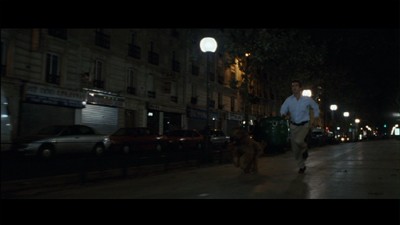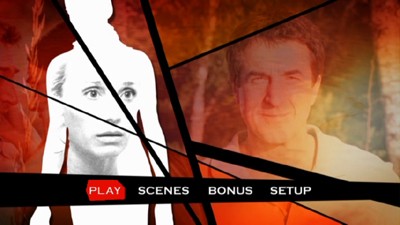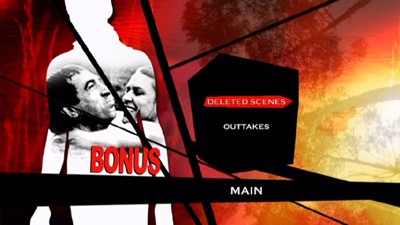| Reviews & Columns |
|
Reviews DVD TV on DVD Blu-ray 4K UHD International DVDs In Theaters Reviews by Studio Video Games Features Collector Series DVDs Easter Egg Database Interviews DVD Talk Radio Feature Articles Columns Anime Talk DVD Savant Horror DVDs The M.O.D. Squad Art House HD Talk Silent DVD
|
DVD Talk Forum |
|
|
| Resources |
|
DVD Price Search Customer Service #'s RCE Info Links |
|
Columns
|
|
|
Tell No One
Music Box Films Home Entertainment // Unrated // December 4, 2012
List Price: $14.95 [Buy now and save at Amazon]
The Film:

A testament to the enduring potency of a thriller lies, oddly enough, in the movie that's left after the thriller aspects have been stripped away -- the things it's able to do on a second viewing, knowing full-well what approaches. Elaborate twists and turns might hold attention for its duration, but does one care about the characters when they know what'll happen, and does the journey itself earn the audience's overarching investment? These are areas where French director Guillaume Canet excels with Tell No One: this isn't a perfunctory thriller built only to twist and turn for the sake of it, instead weaving together desperation and emotional open-wounds about the murder of a man's wife, and what happens when she reappears several years later. Enthralling those watching with Hitchcockian odes and procedural intensity, it also realizes the torment in the mind of a man whose catharsis about finality has been unearthed, and the depth of the sensations he experiences along the way. It's pretty brilliant.
Eight years had passed since Alexandre Beck's (François Cluzet) wife had been murdered, a blur of an event that took place near the lake where they swam and played together as children. All points considered, he's come to grips with Margot's (Marie-Josée Croze) death fairly well: he continues to interact with her family (namely around the "anniversary" of the death) and keeps tabs with his stern but loving sister (Kristen Scott-Thomas), and he's continued working as a children's pediatrician. Everything seemed fine until Alex receives an email with a camera pointed at an undisclosed location, with "M + A" in the subject header and instructions to watch on a specific time and day. Then, he views the impossible: his wife appears, unharmed and in public. This happens around the time when two bodies were found near her murder site, subsequently leading to the case being reopened and Alex garnering the attention of the police. Far from a detective but smart enough to put pieces together, he begins to look into his wife's murder for any indication of what really happened -- and to possibly pick up a trail in order to find her.
The look in Alex's eyes when he view his wife on camera for the first time covers why Tell No One remains effective after several subsequent viewings, and how it affectionately molds to Hitchcock's Vertigo alongside a cat-and-mouse procedural template. Director Canet puts his characters' emotional awareness first, then focuses on where the plot's headed; he comprehends the mental space of a man bewildered by the notion of his murdered wife coming back from the grave, as well as those close to him attempting to keep him stable, and he smartly molds François Cluzet's temperament to uncertainty and disarming confusion. Canet isn't interested in shaping Alex's hunt into an investigative power-trip, instead focused on keeping him an everyman who uses common deduction to get him between points in his sleuthing. Cluzet's nuanced, simmering disposition becomes the lynchpin, where his reactions to what's going on become equally -- if not more -- important than the developments themselves.
Alex's grave but fiery attitude becomes crucial as he enters into dangerous territory while delving into the mystery of his wife's death. Tell No One leads us through busy streets, dark apartments, and gang districts in Versailles as it sustains an invigorating pace that's always reaching for details beyond our reach, while also intelligently playing with the type of ponderings that populate other thrillers of its ilk: why are characters acting suspicious, how will Alex capitalize on offers he's received, and why did that information simply ... disappear? The difference between other films and Canet's surprisingly mature work lies in the self-possessed ways that these questions are competently answered, and how they lead into revelations about the secrets being kept. Backed by emotive scoring (with a few pertinent pop-music tracks, including great usage of U2's "With or Without You") and photographed with that raw focus on Alex's frenetic temper in mind, this hectic, hyperventilating thriller understands how to stress internalization and restrain itself from over-the-top urges.
Tell No One only hits a speedbump at its penultimate curtain-pull on the mystery itself, and the futility of trying to decipher the answers prior to that. Even though the revelations are informed by proper foreshadowing and consistency, the way it's handled -- an intense but long-winded info dump that elaborately connects the dots -- can't avoid a sensation of relative convenience and easy manipulation of the details we're presented, where the film's momentum becomes more about getting Alex in front of the right person with the right cipher. By the same token, again, I'm glad that this doesn't turn into a situation where Alex becomes Sherlock Holmes and figures everything out by himself, and this method of discovery does allow for challenging moral ambiguity. This has a side-effect: director Canet's film can be experienced on level where the audience won't concern themselves with speculation, instead paying undivided attention to everything that Alex experiences and endures -- and the little details of Alex and Margot's life beforehand -- as shrewd suspense-drama that's just as effective without the mystery.
The DVD:
Video, Audio, and Special Features:
What we've got here for review is a reprint of Tell No One's DVD presentation issued a few years ago (reviewed here by Jason Bailey), with no discernible differences to be found. That's not a bad thing: Music Box's 2.35:1-framed, anamorphic presentation remains well-detailed, sports nimble and deep contrast, and expresses the palette's versatile elements -- warm sunlight, lush pinks and greens in flowers, gritty slate shades, and supple skin tones -- with a capable eye. The 5-channel French track isn't a stand-out offering, focusing on dialogue clarity and front-channel energy rather than much in the way of rear-end activity (which there is practically none), but scant sound effects (like thuds and splashes of water) and dialogue are razor sharp. The music sounds pretty solid, too. If you can, I'd steer you towards the Blu-ray presentation (previously reviewed by Adam Tyner (here) and Will Harrison (here)) for the boost in visual prowess and an essential making-of documentary.
Once again, the only supplements included are a thorough series of Deleted Scenes (34:05) and some Outtakes (5:59).
Final Thoughts:
If you've never seen Tell No One, it's worth seeking out. While it's an astutely-crafted thriller that keeps people guessing and on the edge of their seat, there's an emotional power at its core which elevates it into something beyond the twists and nail-biter moments. If you've seen it before, give it another watch: it's surprising how effective it is upon a second glance, when the surprises are spoiled and the energy of Alex's brisk sleuthing and passionate drive are given even more of an opportunity to demand your attention. Personally, I'd go ahead and seek out the Blu-ray for the high-resolution uptick and the additional documentary, but this disc earns a High Recommendation in the DVD arena.
Thomas Spurlin, Staff Reviewer -- DVDTalk Reviews | Personal Blog/Site

A testament to the enduring potency of a thriller lies, oddly enough, in the movie that's left after the thriller aspects have been stripped away -- the things it's able to do on a second viewing, knowing full-well what approaches. Elaborate twists and turns might hold attention for its duration, but does one care about the characters when they know what'll happen, and does the journey itself earn the audience's overarching investment? These are areas where French director Guillaume Canet excels with Tell No One: this isn't a perfunctory thriller built only to twist and turn for the sake of it, instead weaving together desperation and emotional open-wounds about the murder of a man's wife, and what happens when she reappears several years later. Enthralling those watching with Hitchcockian odes and procedural intensity, it also realizes the torment in the mind of a man whose catharsis about finality has been unearthed, and the depth of the sensations he experiences along the way. It's pretty brilliant.
Eight years had passed since Alexandre Beck's (François Cluzet) wife had been murdered, a blur of an event that took place near the lake where they swam and played together as children. All points considered, he's come to grips with Margot's (Marie-Josée Croze) death fairly well: he continues to interact with her family (namely around the "anniversary" of the death) and keeps tabs with his stern but loving sister (Kristen Scott-Thomas), and he's continued working as a children's pediatrician. Everything seemed fine until Alex receives an email with a camera pointed at an undisclosed location, with "M + A" in the subject header and instructions to watch on a specific time and day. Then, he views the impossible: his wife appears, unharmed and in public. This happens around the time when two bodies were found near her murder site, subsequently leading to the case being reopened and Alex garnering the attention of the police. Far from a detective but smart enough to put pieces together, he begins to look into his wife's murder for any indication of what really happened -- and to possibly pick up a trail in order to find her.
The look in Alex's eyes when he view his wife on camera for the first time covers why Tell No One remains effective after several subsequent viewings, and how it affectionately molds to Hitchcock's Vertigo alongside a cat-and-mouse procedural template. Director Canet puts his characters' emotional awareness first, then focuses on where the plot's headed; he comprehends the mental space of a man bewildered by the notion of his murdered wife coming back from the grave, as well as those close to him attempting to keep him stable, and he smartly molds François Cluzet's temperament to uncertainty and disarming confusion. Canet isn't interested in shaping Alex's hunt into an investigative power-trip, instead focused on keeping him an everyman who uses common deduction to get him between points in his sleuthing. Cluzet's nuanced, simmering disposition becomes the lynchpin, where his reactions to what's going on become equally -- if not more -- important than the developments themselves.
 |  |
Alex's grave but fiery attitude becomes crucial as he enters into dangerous territory while delving into the mystery of his wife's death. Tell No One leads us through busy streets, dark apartments, and gang districts in Versailles as it sustains an invigorating pace that's always reaching for details beyond our reach, while also intelligently playing with the type of ponderings that populate other thrillers of its ilk: why are characters acting suspicious, how will Alex capitalize on offers he's received, and why did that information simply ... disappear? The difference between other films and Canet's surprisingly mature work lies in the self-possessed ways that these questions are competently answered, and how they lead into revelations about the secrets being kept. Backed by emotive scoring (with a few pertinent pop-music tracks, including great usage of U2's "With or Without You") and photographed with that raw focus on Alex's frenetic temper in mind, this hectic, hyperventilating thriller understands how to stress internalization and restrain itself from over-the-top urges.
Tell No One only hits a speedbump at its penultimate curtain-pull on the mystery itself, and the futility of trying to decipher the answers prior to that. Even though the revelations are informed by proper foreshadowing and consistency, the way it's handled -- an intense but long-winded info dump that elaborately connects the dots -- can't avoid a sensation of relative convenience and easy manipulation of the details we're presented, where the film's momentum becomes more about getting Alex in front of the right person with the right cipher. By the same token, again, I'm glad that this doesn't turn into a situation where Alex becomes Sherlock Holmes and figures everything out by himself, and this method of discovery does allow for challenging moral ambiguity. This has a side-effect: director Canet's film can be experienced on level where the audience won't concern themselves with speculation, instead paying undivided attention to everything that Alex experiences and endures -- and the little details of Alex and Margot's life beforehand -- as shrewd suspense-drama that's just as effective without the mystery.
The DVD:
 |  |
Video, Audio, and Special Features:
What we've got here for review is a reprint of Tell No One's DVD presentation issued a few years ago (reviewed here by Jason Bailey), with no discernible differences to be found. That's not a bad thing: Music Box's 2.35:1-framed, anamorphic presentation remains well-detailed, sports nimble and deep contrast, and expresses the palette's versatile elements -- warm sunlight, lush pinks and greens in flowers, gritty slate shades, and supple skin tones -- with a capable eye. The 5-channel French track isn't a stand-out offering, focusing on dialogue clarity and front-channel energy rather than much in the way of rear-end activity (which there is practically none), but scant sound effects (like thuds and splashes of water) and dialogue are razor sharp. The music sounds pretty solid, too. If you can, I'd steer you towards the Blu-ray presentation (previously reviewed by Adam Tyner (here) and Will Harrison (here)) for the boost in visual prowess and an essential making-of documentary.
Once again, the only supplements included are a thorough series of Deleted Scenes (34:05) and some Outtakes (5:59).
Final Thoughts:
If you've never seen Tell No One, it's worth seeking out. While it's an astutely-crafted thriller that keeps people guessing and on the edge of their seat, there's an emotional power at its core which elevates it into something beyond the twists and nail-biter moments. If you've seen it before, give it another watch: it's surprising how effective it is upon a second glance, when the surprises are spoiled and the energy of Alex's brisk sleuthing and passionate drive are given even more of an opportunity to demand your attention. Personally, I'd go ahead and seek out the Blu-ray for the high-resolution uptick and the additional documentary, but this disc earns a High Recommendation in the DVD arena.
|
| Popular Reviews |
| Sponsored Links |
|
|
| Sponsored Links |
|
|
| Release List | Reviews | Shop | Newsletter | Forum | DVD Giveaways | Blu-Ray | Advertise |
|
Copyright 2024 DVDTalk.com All Rights Reserved. Legal Info, Privacy Policy, Terms of Use,
Manage Preferences,
Your Privacy Choices | |||||||














